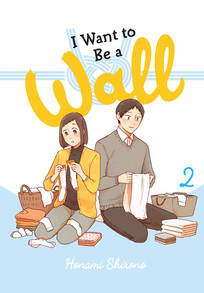Review
by Rebecca Silverman,I Want to Be a Wall
GN 2
| Synopsis: |  |
||
Yuriko, an aromantic asexual, and her gay husband, Gakurouta, continue to feel their way forward in their platonic marriage. Gakurouta desperately wants to be the ally his wife needs and deserves, but there's so much about asexuality that he doesn't understand that he's not sure where to begin. Her friend Momo can help him, but both Yuriko and Gakurouta are still trying to figure things out as they forge ahead in a marriage that doesn't fit society's preferred definition of one. I Want to Be a Wall is translated by Emma Schumacker and lettered by Alexis Eckerman. |
|||
| Review: | |||
You can find our review of volume one here. As your mother, all I want is for you to keep your own happiness in mind. Do you really plan to be alone forever? Those words, spoken with the best intentions, nicely summarize the situation in which the protagonist of I Want to Be a Wall finds herself. Yuriko is asexual and aromantic. Gakurouta is gay and in the closet, in love with his best friend. Neither of them sees traditional marriage as a possibility or even something that will make them happy because she has no interest in love or sex for herself, and he can't marry the one he loves. What right does Yuriko's mother, or society in general, have to make them feel less than if their path to happiness doesn't follow the prescribed route? In its second volume, Honami Shirono's LGBTQIA+ manga continues to present a picture of the compromises people make and their attempts to understand each other in pursuit of being comfortable in their own skin. We get the history of how the leads ended up married before the focus shifts to Gakurouta trying to make sense of Yuriko's sexuality. The result is a book that shines a light on something many people on the asexual spectrum experience as the so-called invisible identity. In volume one, we learned how Yuriko came to understand and accept her orientation, and now we see how she lives in the world because her learning that she's okay and valid in no way translates to others being able to do the same. The greater part of the book is devoted to Gakurouta trying to meet her where she lives. You may recall that Yuriko didn't want to allow him to read all of her BL manga, and this time he discovers that part of the reason is that they're sexually explicit. Yuriko's motivation for keeping these from her husband isn't explained. Still, a likely answer is that she knows that seeing her reading sexual material could cause him to question her asexual identity. That is precisely what happens: Gakurouta really can't wrap his head around why she'd read racy smut books when she has no interest in sex, and it throws him into a bit of a crisis, especially when she starts meeting up with an old (male) college friend every weekend. Although they don't have a traditional marriage, Gakurouta is still concerned that her relationship with Momo could jeopardize what they do have. There's clearly some friend jealousy involved as well. Eventually, Momo sits down with him and explains everything, with the critical information being that asexual readers may take something besides arousal from sexually explicit romance. He likens it to someone who can't taste sweet flavors and still enjoys the fragrances and tart elements of desserts: just because they don't get what you'd expect out of it doesn't mean that they don't get anything. I cannot overstate how important this discussion is in fiction. To be asexual is often to be misunderstood or not believed, and Momo's analogy is a good one. For some ace people who aren't sex-repulsed, reading romance is like reading any other fantasy genre: you may really enjoy crime fiction without ever wanting to be anywhere near a murder, so why can't that apply to romance? Gakurouta hearing Momo's explanation helps him to be a better friend to his wife, and that's something he wants to be, even if he's afraid he'll never understand the BL thing. (Momo also touches on gay men's feelings about BL, but that's a much less in-depth discussion. Hopefully, it will get more attention later.) It also fits in with another theme of this volume: neither partner thinks their marriage is “real.” Presumably, this is because they're not sleeping together and planning to have children; their assertion shines a light on the very narrow definition of marriage that many people have. Gakurouta and Yuriko are life partners, close friends who share their lives. How is that less valid than any other partnership? I Want to Be a Wall still stumbles at times. It's less comfortable discussing Gakurouta's issues than Yuriko's. However, we do see a marked difference between a foreign family's attitude towards their gay son's relationship that stands in stark contrast to Gakurouta's experiences. However, its depiction of friend jealousy is solid, and Yuriko's struggles ring true. It's a needed piece of representation, and even if the series tanks later on, these first two volumes are worth your time and money. Disclosure: Kadokawa World Entertainment (KWE), a wholly owned subsidiary of Kadokawa Corporation, is the majority owner of Anime News Network, LLC. Yen Press, BookWalker Global, and J-Novel Club are subsidiaries of KWE. |
| Grade: | |||
|
Overall : A-
Story : A-
Art : B-
+ Good aro/ace representation and depiction of people's issues with understanding it. Solid depiction of friend jealousy |
|||
| discuss this in the forum (5 posts) | | |||
| Production Info: | ||
|
Full encyclopedia details about |
||